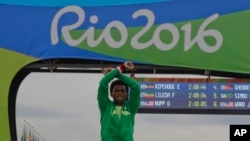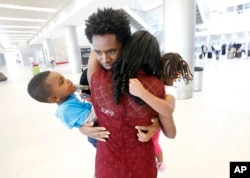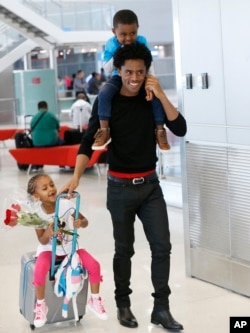Feyisa Lelisa, the 27-year-old Ethiopian silver medal winning marathoner, reunited with his wife, Iftu Mulisa, and two children, 5-year-old daugher, Soko, and 3-year-old son, Sora, on Tuesday at the Miami International Airport after being separated from them for six months.
“It's been tough living alone,” he said speaking to VOA’s Afaan Oromoo Service over the phone in his native Afaan Oromoo. “Back home, I had a lot of support. It hasn’t been easy, but that's part of the struggle. You don't give up,” he said.
Lelisa has been given a U.S. special skill visa with the help of his lawyer and has settled in the U.S. state of Arizona in Flagstaff. His family entered the country on immigrant visas. The distance runner made headlines around the world when he crossed his wrists above his head, making a symbol for protests in the Oromia region of Ethiopia. The anti-government gesture at the 2016 Summer Olympics in Rio de Janeiro put the runner at grave personal risk, and possible retribution toward his family.
Shortly after his refusal to go back to Ethiopia, his wife said that she was scared for the family’s safety but wasn’t surprised by what he did. “He was burning inside when he saw on social media all these dead bodies; people being beaten and people being arrested. So I was not surprised because I know he had a lot of anger inside,” she told Reuters when she was back home.
Ethiopia is currently under a state of emergency after a wave of protests persisted in the Oromia region starting in November 2015 and continued throughout 2016 spreading in the Amhara region. The anti-government protesters initially were about land related issues. However, protesters’ demands shifted to demands for basic human rights and political representation. Since then, security forces are accused of killing hundreds and detaining tens of thousands of protesters, according to Human Rights Watch.
One of many restrictions under the current state of emergency is the very political gesture that Lelisa is famous for. “I didn't make the decision to protest because of my family,” he said speaking about his decision to continue protesting. “I did so to shed light on the oppression, imprisonment, killing and displacement of my people.”
At the time of his protest in the Olympics, the Ethiopian information minister, Getachew Reda, congratulated the athlete, then and assured him that he is safe to return home. Lelisa, however, decided to stay abroad.
Lelisa has no regrets and he pledges to continue working for the betterment of his people back home. “I actually don't think I have done enough for my people. I am still young and have some time to help,” he said. “I would do it all over again. And I am prepared to do all I can and do my part until the Oromo people win their freedom. It remains my biggest preoccupation.”









